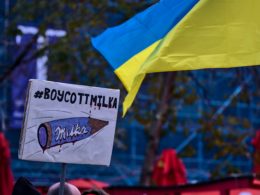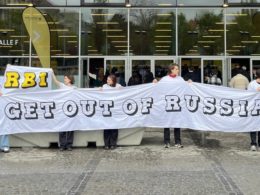The multinational oil and gas company Shell is still trading Russian gas more than a year after it pledged to withdraw from the Russian energy market, BBC reports. The company was involved in nearly an eighth of Russia's shipborne gas exports in 2022, as per the analysis from campaign group Global Witness.
Oleh Ustenko, an adviser to Ukrainian President Volodymyr Zelenskyy, accused Shell of accepting "blood money." However, Shell defended its actions by stating that the trades resulted from "long-term contractual commitments" and do not violate laws or sanctions.
In May, a large tanker carrying over 160,000 cubic meters of liquefied natural gas (LNG) purchased by Shell left the port of Sabetta, on the Yamal peninsula in Russia's far north. This was one of eight LNG cargoes that Shell has bought from Yamal this year, according to data from the Kpler database analyzed by Global Witness.
In March 2022, following the invasion of Ukraine, Shell apologized for buying a cargo of Russian oil and announced its intention to withdraw from Russian oil and gas. It has since sold its service stations and other businesses in Russia and ended its joint ventures with the state energy giant Gazprom. However, it continues to honor its contract with the Russian LNG company Novatek, which obliges it to buy 900,000 tonnes a year from Yamal until the 2030s, according to Reuters.
Ustenko argued, "It is quite simple: by continuing to trade in Russian gas, Shell is putting money into Putin's pockets and helping to fund Russia's brutal aggression against the people of Ukraine." He suggested that the profits made by Shell and the oil industry in Russia should be used to fund the reconstruction of Ukraine.
A spokesman for Shell responded, "There is a dilemma between putting pressure on the Russian government over its atrocities in Ukraine and ensuring stable, secure energy supplies. It is for governments to decide on the incredibly difficult trade-offs that must be made."
Despite the controversy, Shell remains the world's largest trader of LNG, which is not subject to European sanctions. Russia has increased the amount of gas it supplies by ship, including to Europe, even as it reduced its pipeline deliveries last year.
Related:
- 56% of global corporations remain in Russia, possibly funding two months of its war against Ukraine – report
- Nearly year after Ukraine invasion, only 17 of 122 top companies have exited Russia – watchdog
- Western companies supplied components for Russian Orlan drones despite sanctions – media
- Microchip backalley: Armenia, Kazakhstan help Russia evade sanctions, produce weapons
- LNG frenzy boosts Russian gas in Europe, not energy security – opinion




